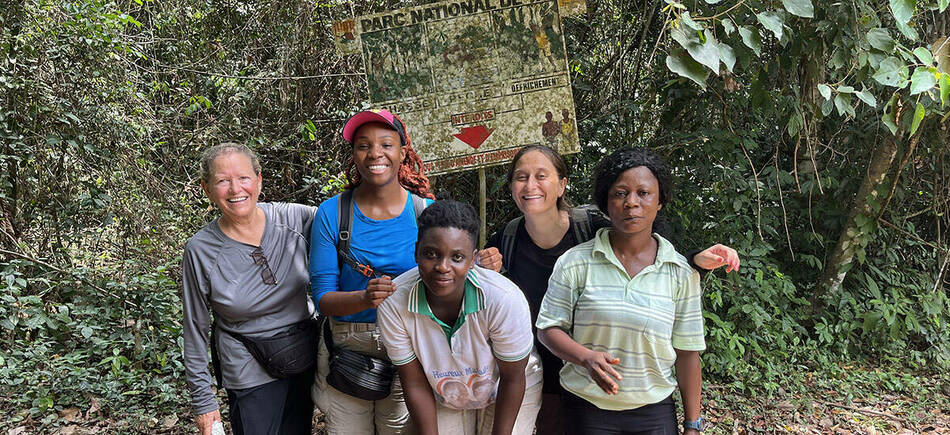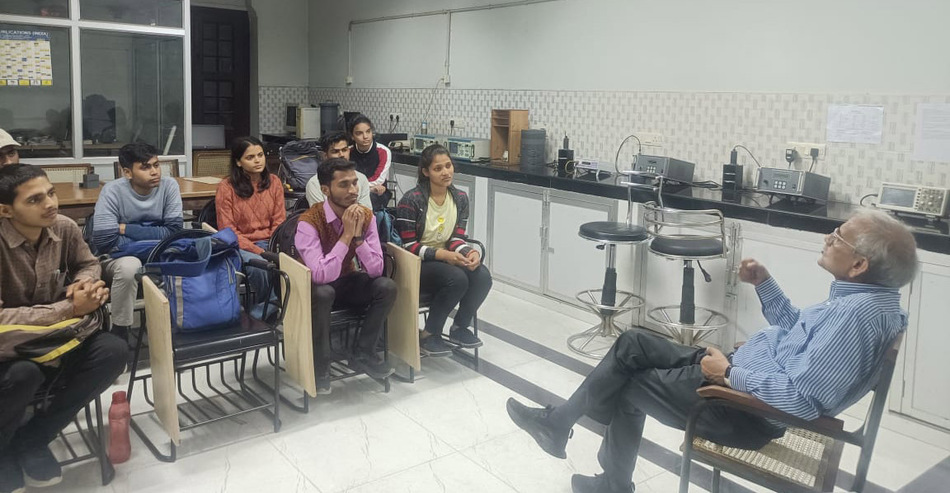Notre Dame’s faculty Fulbright U.S. Scholars advance research, connect with collaborators to address the world’s most pressing challenges
 Notre Dame US Fulbright Scholar Jaimie Bleck (Political Science, second from the right) is joined by a colleague and family at Tai Forests in Côte d’ Ivoire
Notre Dame US Fulbright Scholar Jaimie Bleck (Political Science, second from the right) is joined by a colleague and family at Tai Forests in Côte d’ Ivoire“From Heavens to Earth, the Little Nucleus Reigns Supreme,” was the title of the talk Umesh Garg, professor in the Department of Physics and Astronomy, delivered last February 15th at Bethune College in Kolkata, India.
Garg, a nuclear physicist and Jaimie Bleck, associate professor of political science who studies African politics with a focus on democratization and participation, were the two Notre Dame faculty members awarded Fulbright U.S. Scholar Awards for the last academic year.
The Fulbright Program is the U.S. State Department’s flagship international educational exchange program, designed to promote understanding between the people of the United States and of other countries.
While Garg certainly inspired the audience that day with a lecture that began with the origins of the universe, moved on to the formation of stars, and concluded with the role nuclear physics plays in the world today, the primary purpose of his talk was to encourage students in an array of academic disciplines to choose a career grounded in pure research.
“In India, as in the U.S., students are often counseled to go into law, medicine, computer science, or engineering. My lecture on the creation of the universe presents the idea that an alternative path—pure research—is possible. I want students to know that research is not only intellectually fascinating and personally rewarding, but it is the mechanism that advances society as a whole," says Garg.
It was a talk that Garg gave, with variations, 25 times at 20 institutions—throughout the five-month term of his Fulbright award. And at all those talks, including the one at Bethune College, established in 1879 as the first women’s college in Asia, students approached him afterwards to discover more about his research and, essentially, to discover how they might, too, one day become a scientist.
In fact, Garg recounts, “I acted informally as a recruiter for Notre Dame and its Graduate School.”
Garg undertook his ambitious lecture circuit while also conducting experiments with collaborators throughout India on his academic focus: rotation in nuclei, specifically chirality and “wobbling.” Organized by the director of his host institution, the UGC-DAE Consortium for Scientific Research in Indore, the facilities at which he conducted experiments throughout his Fulbright term offer equipment not available to him in the States.
 Notre Dame US Fulbright Scholar Umesh Garg (Physics and Astronomy) with students and faculty at BITS-Pilani, Hyderabad
Notre Dame US Fulbright Scholar Umesh Garg (Physics and Astronomy) with students and faculty at BITS-Pilani, HyderabadNDI’s role in the Fulbright application process
Within the prestigious and multi-faceted Fulbright Program, Notre Dame International encourages applications by faculty and liaises with the program on their behalf. Undergraduate students work with the Flatley Center for Undergraduate Scholarly Engagement (CUSE) and graduate students with the Graduate School’s Office of Grants and Fellowships.
“Given NDI’s commitment to sparking and fostering international engagement by the faculty, situating the role of faculty liaison for the Fulbright within our office makes sense strategically,” explains Geraldine Meehan, director of faculty engagement for NDI. “The connections an individual scholar makes during a Fulbright term advance the opportunities available internationally for so many other Notre Dame faculty and students.”
Meehan calls the advantages to any faculty member of winning a Fulbright “immense.” First, the Fulbright funding scheme supports a stipend, travel, accommodation, and an allowance for dependents. “The Fulbright name opens doors. It adds a layer of distinction to a visiting scholar that jumpstarts collaboration for a scholar’s own research agenda and, collectively, advances scholarship on any number of pressing global challenges," she adds.
ND Fulbright U.S. Scholar Jaimie Bleck addresses engagement with democracy in West Africa
With democracy and threats to it undoubtedly one of the world’s most pressing global challenges, the focus of Notre Dame Political Scientist Jaimie Bleck’s Fulbright term was on strategies for engagement with democracy among young people in West Africa. Her host from August 2022 to June 2023 was The Jesuit University - the Center for Research and Action for Peace (CERAP) in Abidjan, Côte d’ Ivoire. There, Bleck taught research methods to masters’ level students and continued her book project on the impact of tea-drinking, social clubs (grinw) and their contribution to social capital and democratic resilience among young people in Mali.
A co-authored article based on that research is forthcoming in the American Political Science Review. With enthusiastic participation from many partners throughout Notre Dame, Bleck’s initial collaboration with CERAP expanded into several spheres.
“I was fortunate that colleagues throughout Notre Dame were incredibly supportive in helping to build on the partnership with CERAP,” she says. “For example, the Institute for Scholarship in the Liberal Arts (ISLA) awarded a research grant to political science graduate student Rasheed Ibrahim which enabled us to conduct collaborative research with the CERAP Vice President and fellow political scientist Fr. Brice Bado on youth attitudes toward foreign powers. Additionally, NDI's Jackie Oluoch-Aridi, director, Nairobi arranged and finalized an MOU with CERAP during my stay."
With that as a start, the matrix of collaborations throughout Notre Dame grew even larger during Bleck’s Fulbright term.
“Ernesto Verdeja, associate professor of peace studies and global politics in the Kroc Institute for International Peace Studies, came to Abidjan to give a talk on his research on disinformation and misinformation,” she explains. “And, Holly Rivers, associate director of the Kellogg Institute for International Studies, and I organized a virtual event on human development with two other universities—the African School of Economics (ASE) and Seeka University—as well as with French-speaking students affiliated with Kellogg.”
She adds that Rivers later visited to scout out potential areas of collaboration with CERAP, ASE, Seeka, and the U.S. Embassy.
Past and future ND Fulbright U.S. Scholars
There have been more than 100 Fulbright U.S. Scholar awardees at Notre Dame—faculty and administrators and across all colleges. The deadline for applications for the Fulbright U.S. Scholar Program is mid-September each year.
Two Notre Dame faculty members were successful in the Fulbright U.S. Scholar application cycle last year:
- Sarah Edmands Martin, assistant professor of visual communication design, will design an interactive digital folktale at Norway’s Univeritetet I Bergen. Learn more about her work.
- Steve Reifenberg, teaching professor of international development in the Keough School, will work with faculty and administrators at the Pontificia Universidad Católica de Chile in Santiago. Learn more about his work.
Meehan recommends that any faculty interested in a Fulbright award discuss possibilities and processes with her along with the appropriate departmental chair or dean’s office. With the essence of the Fulbright program one of scholarly exchange, Meehan also notes that NDI is eager to work with faculty who propose that the University act as a host for an existing or potential international collaborator.
“Visiting Fulbright scholars can enrich Notre Dame’s intellectual and research endeavors,” Meehan point out,” as well as help forge new international connections for our faculty and students. And there is no financial outlay for any specific faculty member, department, or college beyond providing access to facilities and programs. The Fulbright Commission underwrites the entire cost of the scholar’s visit.”
For more information on how to apply to be a Fulbright U.S. Scholar or how to host a scholar at Notre Dame, contact Dr. Geraldine Meehan.
| Notre Dame Faculty who Received Fulbright US Scholar Awards for a duration of 3 months or longer since 2016 | |||
|---|---|---|---|
| FACULTY MEMBER | DEPARTMENT | HOME COUNTRY | AWARD YEAR |
| Umesh Garg | Physics | India | 2022-2023 |
| Jaimie Bleck | Political Science | Ivory Coast | 2022-2023 |
| Ani Aprahamian | Physics | Armenia | 2020-2021 |
| Kevin Roche | Engineering | Spain | 2019-2020 |
| Mark Sanders | English | Ecuador | 2018-2019 |
| Christian Poellabouer | Computer Science | Austria | 2018-2019 |
| Semion Lyandres | History | United Kingdom | 2018-2019 |
| Mary Ellen O'Connell | Law | Norway | 2017-2018 |
| Elizabeth Tuleja | Business | China | 2017-2018 |
| Amy Mulligan | Irish Language & Literature | United Kingdom | 2016-2017 |
Originally published by at international.nd.edu on September 15, 2023.
Latest Research
- University of Notre Dame and IBM Research build tools for AI governanceMain Building (Photo by Matt Cashore/University of Notre Dame) …
- Smarter tools for policymakers: Notre Dame researchers target urban carbon emissions, building by buildingCarbon emissions continue to increase at record levels, fueling climate instability and worsening air quality conditions for billions in cities worldwide. Yet despite global commitments to carbon neutrality, urban policymakers still struggle to implement effective mitigation strategies at the city scale. Now, researchers at Notre Dame’s School of Architecture, the College of Engineering and the Lucy Family Institute for Data & Society are working to reduce carbon emissions through advanced simulations and a novel artificial intelligence-driven tool, EcoSphere.
- Seven engineering faculty named collegiate professorsSeven faculty members in the Notre Dame College of Engineering have been named collegiate professors—a prestigious title awarded by the university and college in recognition of excellence in research, teaching and service. The designation may be conferred on faculty at the assistant, associate or…
- ‘A special challenge’: German studies scholar wins National Humanities Center fellowship for research on medieval womenFor CJ Jones, the joy of research is not the answers but the journey. And the next step on that journey is a fellowship with the National Humanities Center. …
- Notre Dame Lead Innovation Team partners with local WIC program to identify, prevent lead poisoning in childrenB.A.B.E. store “shoppers” now have something new to help their families: free lead screening kits offered by the University of Notre Dame’s Lead Innovation Team.
- Notre Dame Welcomes Ninth Cohort of Warrior-Scholars for Transformative Academic JourneyNOTRE DAME, IN – The University of Notre Dame recently concluded its ninth successful Warrior-Scholar Project (WSP) boot camp, hosting 34 dedicated Warrior-Scholars from June 21st to 28th. This intensive, week-long academic residency provided transitioning service members and veterans…













